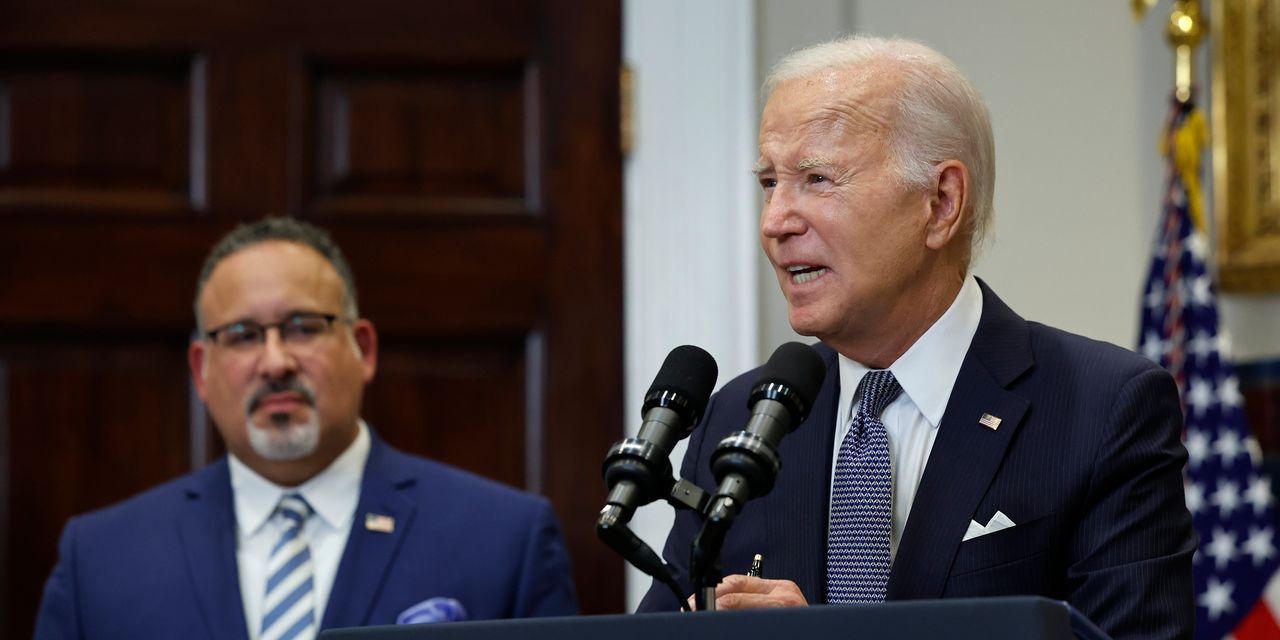The Department of Education is canceling $72 million in debt for 2,300 borrowers who the department found were scammed by their school, officials announced Wednesday.
The borrowers impacted by the announcement attended Ashford University, which was a San Diego-based online for-profit college, between March 1, 2009 and April 30, 2020. To qualify for the relief, borrowers had to fill out a borrower defense application, a claim form borrowers can use to petition to have their debt canceled in cases where they believe they were misled by their schools.
Over the past few years, the department has faced pressure to hold companies and their leadership liable in cases where their conduct resulted in borrowers having their federal loans canceled. Officials indicated Wednesday they’re taking steps in that direction, saying they would review evidence to see whether the company’s leadership during the period covered by the announcement took action that violated the law — and, if so, consider pursuing appropriate remedies.
In addition, officials said they would seek to recoup the cost of the debt discharges from both Zovio, Ashford’s former parent company, and the University of Arizona, which now owns Ashford.
“Our goals here are simple: to help the students who were cheated by their colleges, to hold accountable the people who were responsible for their wrongdoing and to prevent future illegal conduct,” James Kvaal, the undersecretary of education, said on a conference call with reporters.
The University of Arizona and Zovio didn’t immediately provide comment on the department’s announcement.
Separate from other debt forgiveness
The debt relief announced Wednesday is separate from other types of forgiveness that have grabbed headlines in recent months. In June, the Supreme Court struck down the Biden administration’s plan to cancel up to $20,000 in student debt for a wide swath of borrowers. Officials are taking another stab at widespread debt relief; if successful, it will likely impact millions of borrowers regardless of where they went to school.
The department also announced this month that it had started canceling the debt of 800,000 borrowers who have been in repayment for more than 20 years. That relief is part of an effort to fix errors borrowers encountered as part of plans that allow borrowers to repay their debt as a percentage of their income.
The debt cancellation for 2,300 borrowers announced Wednesday is the latest salvo in a years-long saga over how to make borrowers who have been scammed by their schools whole. A law that’s been on the books since the 1990s has allowed borrowers to have their debt wiped out in cases where they’ve been misled by their schools. But it wasn’t widely used until 2015, when activists organized former for-profit college students to file claims en masse.
In 2016, the department created a streamlined process for borrowers to apply for relief under the law. In August, a federal appeals court blocked a new version of the borrower defense rule, which the department issued in 2022. Wednesday’s announcement covers loans under the 1995 or 2016 version of the regulation, officials said.
In determining whether borrowers were eligible for relief under the law, the department used evidence from a 2017 lawsuit filed by the California Department of Justice, which alleged Ashford and its then parent company, Zovio, misled students in order to convince them to enroll in the school. A California trial court agreed with the state and ordered the companies to pay a $22.3 million fine. Zovio appealed the ruling last year.
Ashford allegedly misled students about job placement, costs
The relief is based on evidence gathered by the California Department of Justice as part of the suit and independently reviewed by the U.S. Department of Education, the department said. Officials found that during the relevant period, Ashford recruiters told prospective students they would be able to work as licensed professionals in fields like nursing and social work. In reality, the school didn’t have the necessary approval or accreditation for its programs to translate into jobs in those fields, the department said.
In addition, the department found Ashford representatives told students that every Ashford student qualified for a Pell grant, the money the government provides to low-income students to attend college, and suggested that students would spend just $50 to $75 a month on loan payments. In some cases, recruiters made those statements to prospective students without access to borrowers’ financial-aid information, which indicates the grants and loans borrowers are eligible for, according to the department.
Ashford also described its program as an “accelerated” bachelor’s degree, when in reality it was structured to take five years to complete, the Department of Education and California Department of Justice said.
“Today’s announcement shows yet again the value of a strong partnership between the federal government and the states,” Kvaal said. “The department would not have been able to deliver this relief today without the hard work of [California Attorney General Rob] Bonta and the California Department of Justice.”
Borrowers who are eligible for the relief will receive an email in September indicating their borrower defense applications have been approved, the department said. These borrowers won’t have to take any further action, and they will receive refunds for any money they’ve paid toward those loans.
In July, the department granted relief automatically to 7,400 borrowers who attended Colorado-based locations of CollegeAmerica, another for-profit college, during a certain period. That mass discharge was based on evidence gathered by Colorado’s attorney general.
In the Ashford case, borrowers need to have filled out a borrower defense application in order to qualify to have their debt discharged. Borrowers who attended Ashford during the relevant period and didn’t file a borrower defense claim can apply for relief, Bonta said on a conference call with reporters.
“I encourage anyone who thinks they might be eligible to check and to apply, if so,” he said. “You deserve justice.”
Read the full article here


